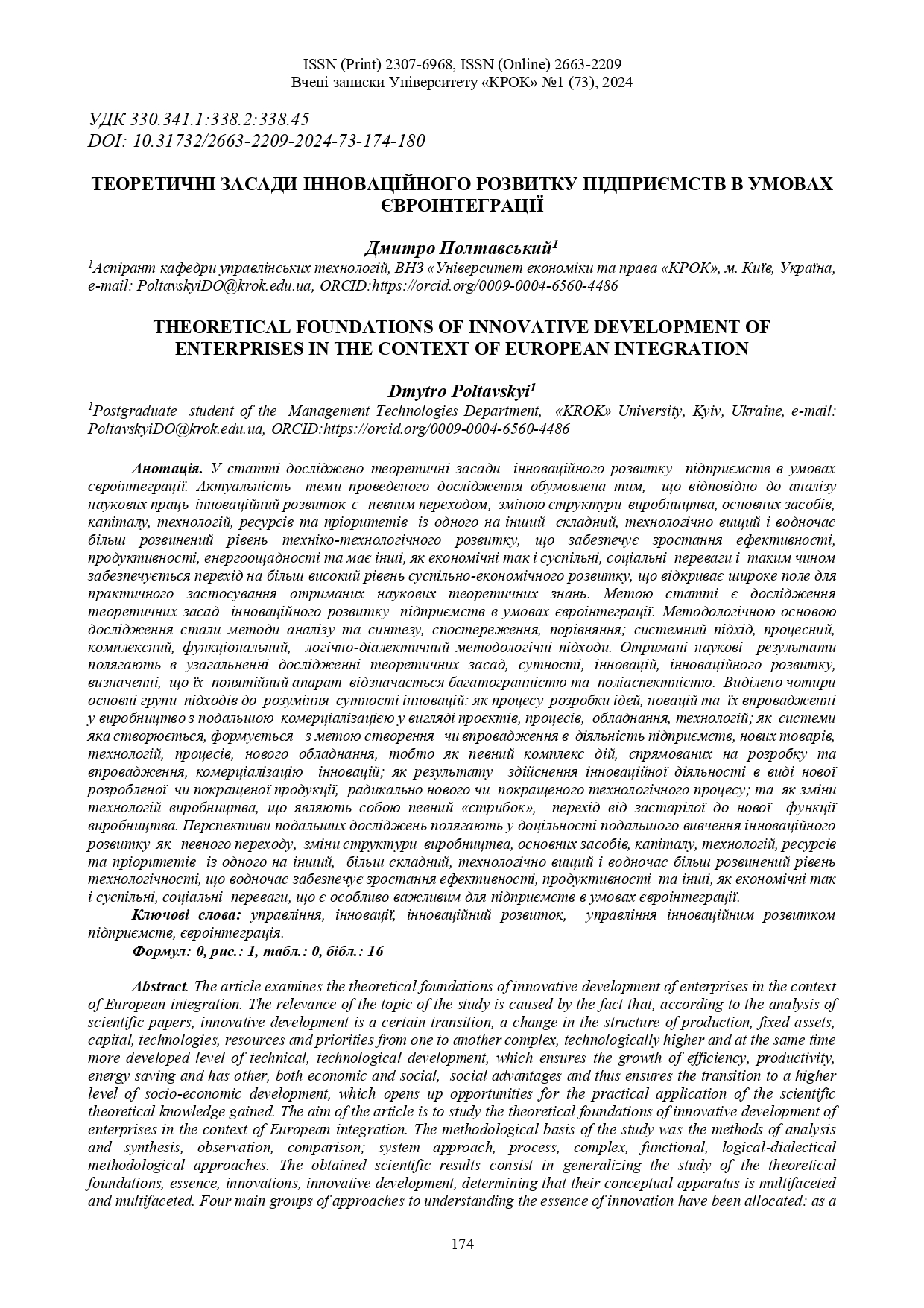THEORETICAL FOUNDATIONS OF INNOVATIVE DEVELOPMENT OF ENTERPRISES IN THE CONTEXT OF EUROPEAN INTEGRATION
DOI:
https://doi.org/10.31732/2663-2209-2024-73-174-180Keywords:
management, innovation, innovative development, management of innovative development of enterprises, European integrationAbstract
The article examines the theoretical foundations of innovative development of enterprises in the context of European integration. The relevance of the topic of the study is caused by the fact that, according to the analysis of scientific papers, innovative development is a certain transition, a change in the structure of production, fixed assets, capital, technologies, resources and priorities from one to another complex, technologically higher and at the same time more developed level of technical, technological development, which ensures the growth of efficiency, productivity, energy saving and has other, both economic and social, social advantages and thus ensures the transition to a higher level of socio-economic development, which opens up opportunities for the practical application of the scientific theoretical knowledge gained. The aim of the article is to study the theoretical foundations of innovative development of enterprises in the context of European integration. The methodological basis of the study was the methods of analysis and synthesis, observation, comparison; system approach, process, complex, functional, logical-dialectical methodological approaches. The obtained scientific results consist in generalizing the study of the theoretical foundations, essence, innovations, innovative development, determining that their conceptual apparatus is multifaceted and multifaceted. Four main groups of approaches to understanding the essence of innovation have been allocated: as a process of developing ideas, innovations and their implementation in production with subsequent commercialization in the form of projects, processes, equipment, technologies; as a system that is created, formed for the purpose of creating or introducing into the activities of enterprises, new goods, technologies, processes, new equipment, that is, as a certain set of actions aimed at the development and implementation, commercialization of innovations; as a result of innovation activity in the form of new developed or improved products, radically new or improved technological process; and as changes in production technologies, which represent a certain "leap", a transition from an obsolete to a new production function. Prospects for further research lie in the expediency of further study of innovative development as a certain transition, change in the structure of production, fixed assets, capital, technologies, resources and priorities from one to another, a more complex, technologically higher and at the same time more developed level of manufacturability, which at the same time provides an increase in efficiency, productivity and other, both economic and social, social advantages, which is especially important for enterprises in conditions of European integration.
Downloads
References
Бажал, Ю.М. (1996). Економічна теорія технологічних змін. К.: Заповіт, 240 с.
Лапко, О. (1999). Інноваційна діяльність в системі державного регулювання. К.: Інститут ек. прогнозув. НАН України. 253 с.
Twiss, B. (1974). Managing Technological Innovation. London: Longman. 194. р.
Porter, M. (1988). Cluster and the New Economic of Competition. Harvard Business Rev. №12. Pp. 77–90
Porter, M. (1986). Competition in Global Industries. Harvard Business Press. 581 p.
Schumpeter, J. (1939). Business Cycles: A Theoretical, Historical, and StatisticalAnalysis of the Capitalist Process. N. Y.; L.: McGraw-Hill Book. 430 р.
Mensch, G. (1979). Stalemate in Technology: Innovations Overcome theDepression. Cambridge. 320 р.
Ілляшенко, С. М. (2005). Проблеми управління інноваційним розвитком підприємств у транзитивній економіці. Суми: Університетська книга. 582 с.
Поліщук, Н. В. (2009). Теоретичні підходи до визначення сутності інновацій. Галицький економічний вісник. № 1 (22). С. 20 –23
Ястремська, О. М. (2004). Інвестиційна діяльність промислових підприємств: методологічні та методичні засади. Х.: ХДЕУ. 472 с.
Мочерний, С. В. (2005). Економічний енциклопедичний словник: у 2 т. Львів: Світ. 616 с.
Язлюк, Б. (2006). Економічний зміст інвестиційно-інноваційної діяльності підприємств та напрямки її трансформації. Тернопіль: Економічна думка. Вип. 6. С. 47-51.
Громика, Р. П. (2013). Теоретичні засади інноваційного розвитку підприємства. Науковий вісник Полтавського університету економіки і торгівлі. № 5 (61). С. 83-87.
Пересунько, З. М. (2013). Теоретичні аспекти розвитку інноваційної теорії. Ефективна економіка. № 7. URL: http://www.economy.nayka.com.ua/?op=1&z=2192
Freeman, C. (1995). The National System of Innovation in Historical Perspective. Cambridge Journal of Economics. Vol. 19. №. 1. С. 15-18.
Litvin N. Prospects for attracting European investment in Ukraine's economy / N. Litvin, S. Tkalenko // Abstracts II International Conference on economics, accounting and finance (Tallinn, Estonia. November 05, 2021) . Available at: https://conf.scnchub.com/index.php/ICEAF/ICEAF-2021/paper/view/338

Downloads
Published
How to Cite
Issue
Section
License

This work is licensed under a Creative Commons Attribution-NonCommercial 4.0 International License.

